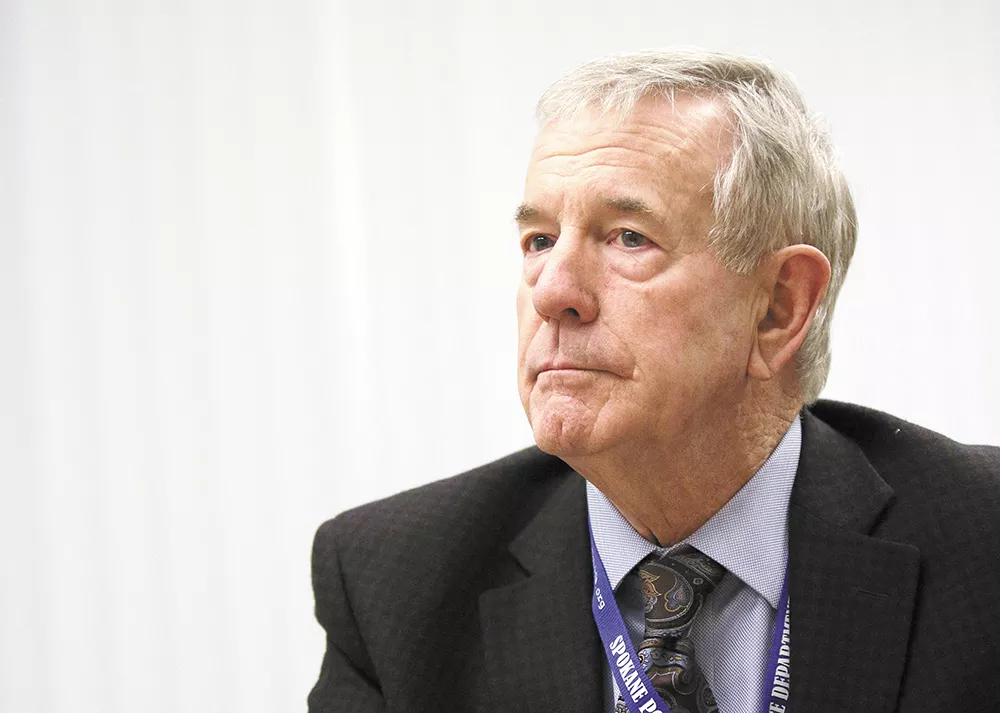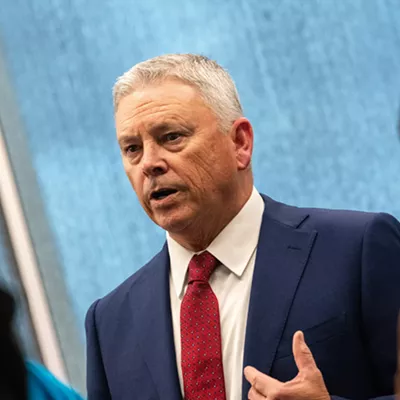
Jim McDevitt was once the U.S. attorney tasked with investigating disgraced Spokane police Officer Karl Thompson. Today, he's on the other side, tapped by Mayor David Condon to lead the police department while the city scrambles to find a permanent replacement after the previous chief was forced to resign and his interim replacement suddenly retired.
McDevitt doesn't want to talk about the prosecution of Thompson, who spent four years in prison for fatally beating a mentally disabled janitor and lying about it to investigators.
Instead, McDevitt is busy immersing himself in the culture of the department: attending roll call, meeting with brass, visiting the training academy, going for ride-alongs. He plans to assemble a vertical advisory committee — one person from every level, from patrol to commanders — to help him understand the intimate details of police work.
As an outsider and someone with a record of holding police accountable, McDevitt might seem like an ideal interim candidate. But many have already criticized Condon's decision to hand McDevitt a four-month gig worth $64,000 — in light of comments McDevitt has made about race and policing.
McDevitt penned an editorial for the Spokesman-Review in 2015, criticizing protests over controversial police shootings and suggesting the "real problem" was not police shooting black men, but violence among African Americans.
McDevitt resigned his position on the committee in charge of coming up with qualifications for the next police chief when other members openly raised questions about his editorial. Naima Quarles-Burnley, Spokane's NAACP president, called McDevitt's comments "abhorrent." Local activist Kitara Johnson helped organize a "die-in" protest in the Chase Gallery outside city council chambers.
And recently, Police Leadership Advisory Committee chairwoman Mary Ann Murphy resigned, citing issues with McDevitt and suggesting that Spokane County Sheriff Ozzie Knezovich take over the department instead.
And so in his second week of work, McDevitt — an uncommissioned, retired attorney with no experience leading a police force — is tasked with managing the tensions that have defined the Spokane Police Department for the past decade.
"It's been like drinking from the fire hose," McDevitt says of the breadth of information he's had to take in so far. "I've got a lot to learn about how this department works."
A MATTER OF OPINION
Were he to do it over, McDevitt says he would make absolutely clear in the article that he was not supporting racial profiling in policing. He says he was pointing out that it exists, and offering up a reason why.
It's the "why" that has community members questioning his integrity.
McDevitt says he was responding to criticism of law enforcement writ large. That condemnation followed the death of black teenager Michael Brown at the hands of a police officer in Ferguson, Missouri, and a grand jury's decision not to indict anyone in the death of another black man, Eric Garner, in New York City, even after a video showed an officer using an improper chokehold.
In his editorial, McDevitt first cites an ancient use-of-force principle before listing statistics purporting to show that African Americans are more violent than whites.
"Why haven't we heard the same level of anger on this subject from those in high places? Where are the protests against this continuing slaughter of young men of color?" he asks.
Critics find problems with his logic.
First, according to one of Spokane's ombudsman commissioners, AJ VanderPol, the article appears to go beyond shielding police officers from accusations of racial bias. He says that it "villainizes" black people as inherently more violent, and ignores institutionalized racism in the criminal justice system.
Second, as councilmember and former Center for Justice director Breean Beggs points out, the use-of-force standard McDevitt cites is not supported by current U.S. Supreme Court precedent in Tennessee v. Garner, which says that a person must pose a threat of death or serious physical harm to justify deadly force.
"You can't kill someone for incooperation," Beggs says. "He used an analysis from the 1800s. That's not what binds our country."
Finally, the assertion that the country — especially the African American community — is not as outraged over black-on-black violence is false, critics say. As journalist and author Ta-Nehisi Coates pointed out amid protests in Ferguson in 2014, history and a basic Google search show otherwise. Coates cites rallies in communities across the country — including Louisville, Kentucky, and Baton Rouge, Louisiana, as well as Philadelphia; Chicago and St. Louis — that have taken on the issue of urban violence.
"Police in America are granted [a] wide range of powers by the state including lethal force," Coates writes. "With that power comes a special place of honor. When cops are killed the outrage is always different than when citizens are killed. Likewise when cops kill under questionable terms, more scrutiny follows directly from the logic of citizenship. Great power. Great responsibility."
A MATTER OF REPARATIONS
As of press time, a Department of Justice-moderated community forum to address concerns about McDevitt's appointment was scheduled for Wednesday evening at the Spokane Public Library. It's there that Johnson, VanderPol, Quarles-Burnley, Murphy and others hope to talk about the mayor's decision and McDevitt's opinions.
"I look forward to a dialogue," McDevitt says. "But I hope people would look beyond the editorial and look at the greater body of work. I don't support racial profiling, and I'm very aware of the issues."
He points to his work on the Blueprint for Reform, a collection of suggested improvements to the criminal justice system, and his role on the state Clemency & Pardon Board, which he says has shown him the difficulties of getting a job with a criminal record.
"That's an issue of increasing concern for me," McDevitt says.
Although there are restrictions to his position other than the short time frame — disciplinary and employment decisions are left to Assistant Chief Craig Meidl — McDevitt aims to accomplish more than a few things before he leaves.
Among his most pressing goals is the public's perception of the department, and a few unaddressed recommendations from the Blueprint for Reform.
For his part, Sheriff Knezovich says he's eager to discuss those possibilities. He points to a collaborative city/county chronic offender unit as one possibility.
"Maybe there's a way we can help strengthen that," he says. "This would be a great time to take it and run."
McDevitt also wants to address an issue that he's heard is a concern among officers: a lack of resources. Despite the fact that the number of commissioned officers is higher than it's been in recent memory — 307 currently, compared to 275 in 2011 — McDevitt suggests that more patrol officers could lead to more meaningful community relationships.
"It's going to be up to the powers that be, but community outreach is very important," he says. "When you've got an officer out on patrol who's got six calls stacked up, they can't do any real meaningful contact with the public."
When it's all said and done, he's even considering writing an op-ed, he says: A "day in the life of the department."
"Let's see where we go in the next four months, and then the public can justifiably give me a report card," he says. ♦





















